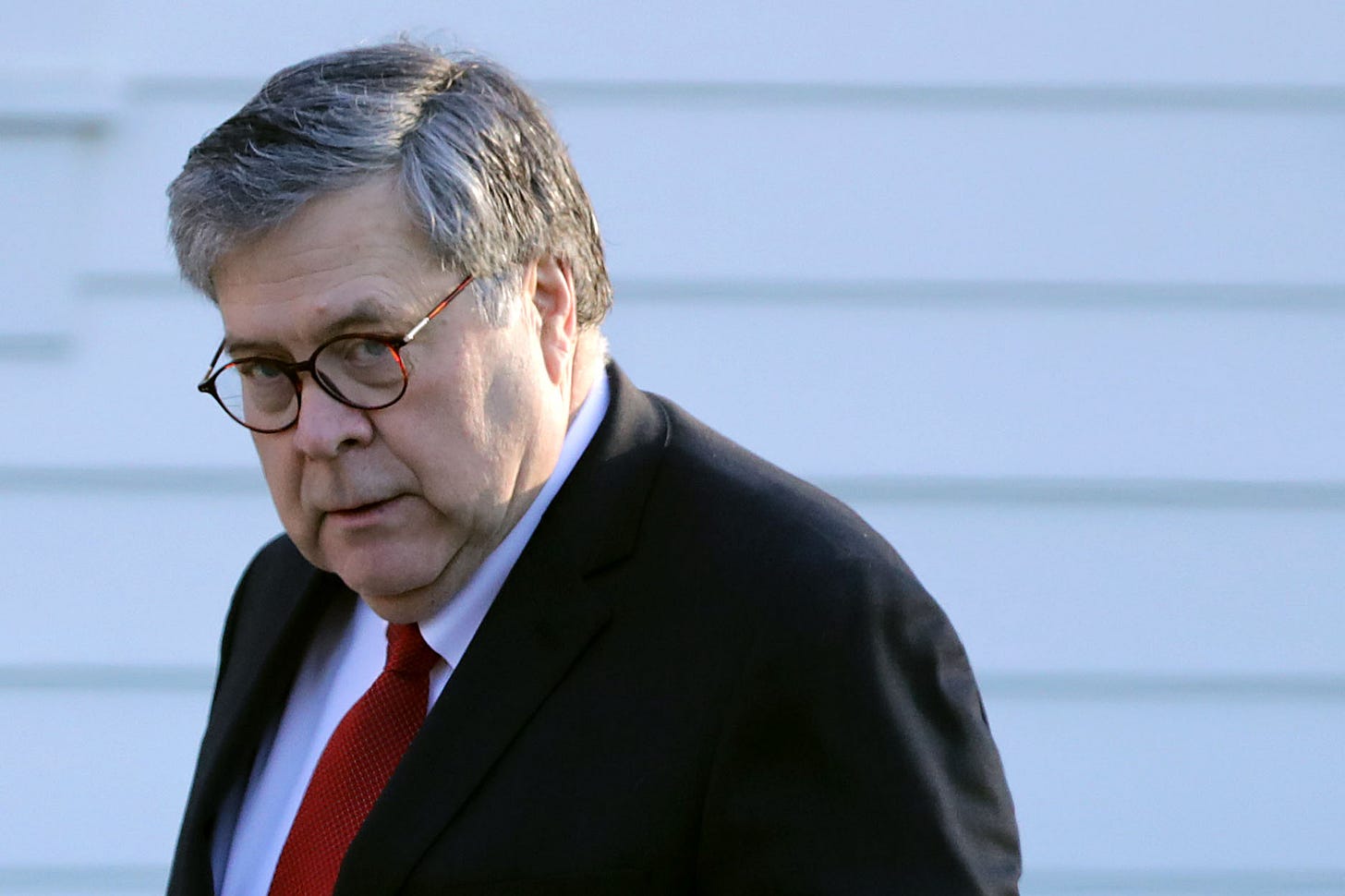No Honorable Middle Ground for Barr
Maybe the attorney general is playing a sophisticated game so that he can't be criticized when he slams Trump. Or maybe not.

William Barr has seemingly embraced the one job qualification necessary for survival inside the Trump administration: make no attempt to find an honorable middle ground.
Barr has always been viewed as a conservative ideologue, and by some even as a political toady. But he has also been viewed by most as an institutionalist at heart.
Barr seems to understand that, in his new role as Trump’s attorney general, he can’t be both. He’s going to have to pick a lane.
The modern political battlefield is littered with the corpses of those who tried to thread the needle. They believed that by sacrificing a measure of their personal dignity and self-respect, they could discreetly rein in Trump’s worst instincts without challenging him head-on. In essence, they believed they could flatter and humor Trump, much as you would a petulant child, while quietly steering policy into a more sane, safe direction. They convinced themselves that Trump wouldn’t notice, at least not for long, and that he would quickly be distracted by some other bright object.
For some, that strategy worked. For a while. Trump’s attention span is such that those around him have sometimes keep him at bay, by ignoring his illegal, unethical or just plain idiotic orders, confident that he soon would be obsessing about something else he saw on Fox News.
But benign neglect isn’t a sustainable long-term strategy for dealing with Trump.
Eventually, Trump’s lizard brain kicks in. He intuitively divides the world around him into those who actively encourage his worst instincts, on the one hand, and those who try to rein him in, on the other.
Those who fall into the latter category have without exception found themselves not only out of their jobs, but also with their reputations in tatters.
Just ask former Chief of Staff General John Kelly, who soldiered through “the worst [expletive] job I’ve ever had” in the vain hope that he could continue to serve his country. Or former Secretary of Defense James Mattis, who undertook the quixotic task of explaining to our allies that the statements of the president of the United States didn’t really express our nation’s foreign policy. Or Jeff Sessions, who shamelessly kissed up to Trump in public, while at the same time refusing to launch illegal, politically motivated criminal investigations into Trump’s adversaries and critics.
Or dozens of others.
For every one of them, the attempt to find the middle ground has led to ruin. It has cost them both their jobs and their reputations. What they didn’t seem to realize was that serving Trump demands making a choice between the one and the other. They couldn’t have both.
William Barr gets it, and he seems to have made his choice. He has chosen, at least to this point, to sublimate his institutionalism in favor of the Trumpian view of his “job,” defined at the highest levels of the Trump administration as protecting the president.
It began with Barr’s 4-page letter summarizing what he called the “principle conclusions” of the still-secret Mueller report. As I explained in “4 Big Problems with Barr’s Report,” Barr’s letter gave what is almost certainly a false impression that Mueller explicitly left the decision on obstruction of justice to Barr himself. It summarily decided that issue in Trump’s favor, thus undermining the entire purpose of the special counsel regulation to take the decision about presidential misconduct away from a politicalappointee. It gave Trump a valuable political talking point. And it omitted anything even vaguely critical of the president.
If there were any remaining doubt about Barr’s decision to go all-in as Trump’s defender, that doubt evaporated in Barr’s testimony to the House Appropriations Subcommittee.
Barr managed to lend credence to Trump’s campaign battle cry that the Mueller investigation was a “witch hunt,” refused to characterize any portions of the Mueller report except those that seemed to cut in Trump’s favor, refused to answer questions about whether he has discussed the Mueller report with the White House, refused to take issue with Trump’s characterization of the Mueller report as “total exoneration;” and offered a wholly gratuitous plug for Trump’s wall that has absolutely nothing to do with his job as attorney general.
It is still possible that Barr is playing a highly sophisticated game of positioning himself as a paragon of fairness to Trump so that he can’t be criticized when he lowers the boom on him. If he produces a minimally redacted version of the Mueller report that hides none of Mueller’s findings about Trump’s behavior, and if he accepts those findings without criticism, he can brand his detractors (like me) as premature in their condemnation of him.
But nothing he has said or done to date should give anybody comfort that he will do that.
If he doesn’t, history will not judge him well.
He will join the likes of Stephen Miller, Mick Mulvaney, Mike Pence and Steven Mnuchin as the latest incarnations of Haldeman, Ehrlichman, and Colson.
And he will have brought every bit of it on himself.


